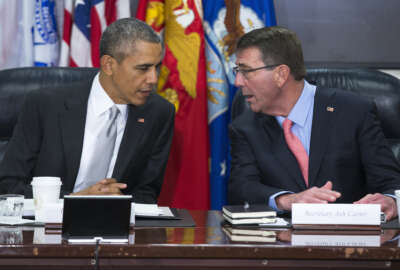The National Security Council will be forced to trim its staff over the next year and a half, but that may not curb the growth of advising employees under the Trump administration.
Some national security experts think the way President-elect Donald Trump is setting up his counsel could cause the number of employees in the White House to grow.
That comes on the heels of a 2017 defense authorization act which caps the number of people that can work for the NSC at 150.
But when it comes to other advising boards, such as the Homeland Security Council, and the coordination between the boards more staff may be needed.
“On the big issues dealing with international affairs ranging from homeland security through national security to economic affairs and trade we are now going to have four individuals who are all in the White House directly reporting to the President and the question is ‘Who is going to coordinate the coordinators,’” said Ivo Daalder, president of the Chicago Council on Global Affairs, during a Jan. 5 Council on Foreign Relations event in Washington. “These are the people who are going to be coordinating various parts of the government and then they have to coordinate with themselves … The coordination of the coordination function in the White House is a recipe for more staff.”
Trump is adding to the existing advisory councils by creating the National Trade Council, headed by David Navarro.
Trump will also have the National Economic Council and possibly the Homeland Security Council.
President Obama merged the Homeland Security Council with the NSC; there is no news as to whether Trump will decouple the two.
Daalder said more staff and more advisory boards will create conflict in the White House.
He added that Trump seems to like that conflict and wants different people coming forward with different points of view.
“He’s creating a White House organization that will do that in spades,” Daalder said.
Still, the NSC will have a lot of rearranging to do under the new administration. The Wall Street Journal reported Trump wants to restructure the Office of the Director of National Intelligence because it is bloated and politicized.
But, Amb. David Miller, a former national security advisor, who is now a senior fellow at the Atlantic Council said the NSC leans toward an all-purpose foreign policy office that tends to be populated with people trusted by whatever administration is in office and not necessarily with staffers with proven interagency experience.
A lesser role for ODNI may put more pressure on NSC to perform. Despite that possibility, national security experts favored shrinking the size of the NSC.
Mac Destler, civic engagement professor at the University of Maryland, College Park, said people in the NSC tend to own issues they are working on. That can become a problem because they will not share work on an issue with government agencies.
“It creates a bottleneck,” Destler said. “The large number is the enemy of the good. … we think 40 to 50 [people] is about right. Now that did not include Homeland Security, so if you add that it makes it a little bigger. Clearly under [George] W. Bush and Barack Obama it’s gotten a lot bigger.”
Daalder said he thought the President should have the discretion to hire the number of people he thought appropriate and Congress should not legislate a certain staff value. Daalder agreed the more people on NSC, the busier they will be on issues they shouldn’t been working on.
Copyright
© 2024 Federal News Network. All rights reserved. This website is not intended for users located within the European Economic Area.
